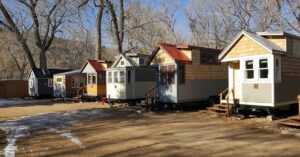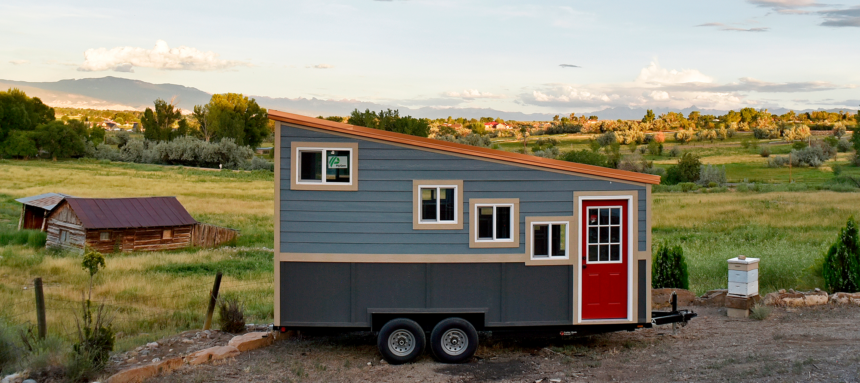Colorado’s housing market has been changing in recent years as more individuals search for flexible, reasonably priced, environmentally friendly living choices. A revolutionary answer that lets people and families live in a simpler, more sustainable way is tiny dwellings. The tiny house builders Colorado, who are rethinking homeownership and space, are leading this movement front and foremost. Their creative designs and the rising popularity of small cabin kits not only serve to solve housing shortages but also shape the direction of state residential life going forward.

The Rise of Tiny Homes in Colorado
Renowned for its scenic settings, outdoor way of life, and progressive attitude to sustainability, Colorado has grown to be a gathering centre for the tiny home movement. Many Coloradans are looking for other living options as cities like Denver, Boulder, and Colorado Springs’ house values keep rising. Small residences provide a means to appreciate the natural beauty of the state while reducing the environmental effect connected with more conventional construction. Leading the trend are small house builders in Colorado who create reasonably priced, energy-efficient, compact homes appealing to a wide spectrum of consumers from young professionals to retirees.
Additionally, a solution for the state’s rising need for reasonably priced dwellings is tiny houses. Many people are finding themselves priced out of the conventional housing market as property values and rent expenses become ever more expensive. Working with Colorado’s small house builders allows individuals to invest in substantially less expensive to build, maintain, and live in homes. Particularly appealing for people looking for financial freedom and independence, the low cost of tiny homes lets residents live mortgage-free or with a far reduced financial load.
Sustainability and Eco-Friendliness: The Key Drivers
Tiny Homes’ emphasis on sustainability is among their most notable benefits. Colorado’s small house builders are setting the standard for ecologically friendly, energy-efficient construction. These smaller-footprint homes use fewer resources and their design frequently includes energy-saving elements including solar panels, composting toilets, and rainwater collecting systems. These sustainable elements not only lessen the environmental impact of the house but also help the owners to pay less utilities.
Another important characteristic of Colorado’s small homes is the focus on environmentally friendly building materials. In their building projects, builders are turning to recycled materials, recovered timber, and other green resources more and more. Many Colorado citizens, give maintaining the state’s natural beauty priority and reducing their carbon footprints top importance, reflected in their dedication to sustainability.
Building sustainable, energy-efficient homes is projected to continue as the climate catastrophe turns into an immediate concern. Colorado’s tiny house builders are demonstrating how small-scale, environmentally responsible living can be both pragmatic and fulfilling for other areas.

Tiny Cabin Kits: A Game-Changer for Affordable Housing
Apart from bespoke small houses, another trend becoming popular in Colorado is the emergence of tiny cabin kits. For anyone wishing to construct their own small house, these pre-designed kits provide a more reasonably priced and easily available solution. For people who want the pleasure of creating their own space free from the complexity and expense of conventional building, small cabin kits are a great option.
Usually featuring all the tools required to build the house—pre-cut wood, structural supplies, roofing, and insulation—tiny cabin kits also include Many find great attraction in little cottage kits because of their simplicity and economy. Builders frequently assist customers in choosing the ideal kit depending on their requirements and budget, and by performing much of the work themselves homeowners can save money.
Off-grid living or vacation houses especially find these packages quite appealing. Tiny cabin kits are being used by many Coloradans to build sustainable, low-maintenance dwellings allowing people to live off the land or to create retreat homes in the state’s isolated mountain regions. Embracing this trend, Colorado’s small housebuilders provide a selection of kits meant to fit various tastes, finances, and sites.
The Benefits of Tiny Homes for Colorado Communities
In Colorado, small housebuilders are not only enabling people to realise their dream of homeownership but also helping to create lively, environmentally friendly communities. Tiny homes’ capacity to fit into a range of settings—from urban backyards to rural mountain plots—helps to be one of their main advantages This adaptability allows small dwellings to be included into existing communities in ways that bigger homes cannot.
To help with homelessness, several Colorado towns and cities are even embracing small house villages. For those who are homeless or in danger of becoming so, these communities offer reasonably priced homes. Working with small house builders in Colorado, these communities can provide families and individuals in need with safe, permanent housing choices.
Little houses also help to create connection and community. Small dwellings inspire a more social style of life and neighbour engagement given their limited footprint. Sometimes small Colorado homes have set aside common areas for cooking, gardening, and socialising, so fostering resident cooperation and a sense of belonging.
Overcoming Challenges: Zoning Laws and Regulations
Even though small homes are becoming more and more popular, zoning rules and building requirements still provide obstacles to be solved. Local rules in many parts of Colorado do not suit the special character of tiny dwellings. Small house builders in Colorado may find it challenging to realise their ideas given zoning rules defining minimum square footage for residential buildings as well as building requirements requiring larger residences.
These difficulties aren’t insurmountable, though. Many Colorado small house builders are closely collaborating with local governments to push changes in building laws and zoning. Certain municipalities have already acted to facilitate the construction of small dwellings by designating areas specifically for them or by changing building standards to meet their demands.
More municipal governments will probably follow suit as the demand for small homes rises, allowing Colorado’s tiny housebuilders to create projects that satisfy modern homeowners’s wants more easily.

The Future of Tiny Homes in Colorado: What’s Next?
Colorado’s little homes have a bright future. Tiny housebuilders in Colorado are positioned to keep changing the housing scene given the expanding population of environmentally concerned, financially savvy, and space-sensitive citizens. New ideas and designs will keep coming out as the tiny house movement gathers steam, so increasing the practicality, comfort, and energy efficiency of these little dwellings.
The growing availability of small cabin kits, which enable tiny dwellings even more accessible to a larger audience, is one fascinating change. These kits give people a cheap and easy way to build their own houses. Tiny cabin kits are probably going to become even more popular as the tiny house market expands for Colorado people trying to downsize and streamline their lives.
Furthermore, Colorado’s rising trend of sustainable, off-grid living will probably drive demand for small houses with energy independence and self-sustaining ability. Tiny house builders in Colorado will have access to even more creative techniques and materials as technology develops that will enable people to build sustainable, self-sufficient houses.
Conclusion
Colorado’s small house builders lead the way in a housing revolution altering public perceptions about homeownership. Their emphasis on sustainability, cost, and innovation helps to define the direction of state housing going forward. From reasonably priced tiny cabin kits to custom-built small homes, Colorado citizens have a great range of choices. Small dwellings will surely become increasingly important as this movement expands in helping the state with housing issues and giving people the flexibility to live according to their values and way of life.






